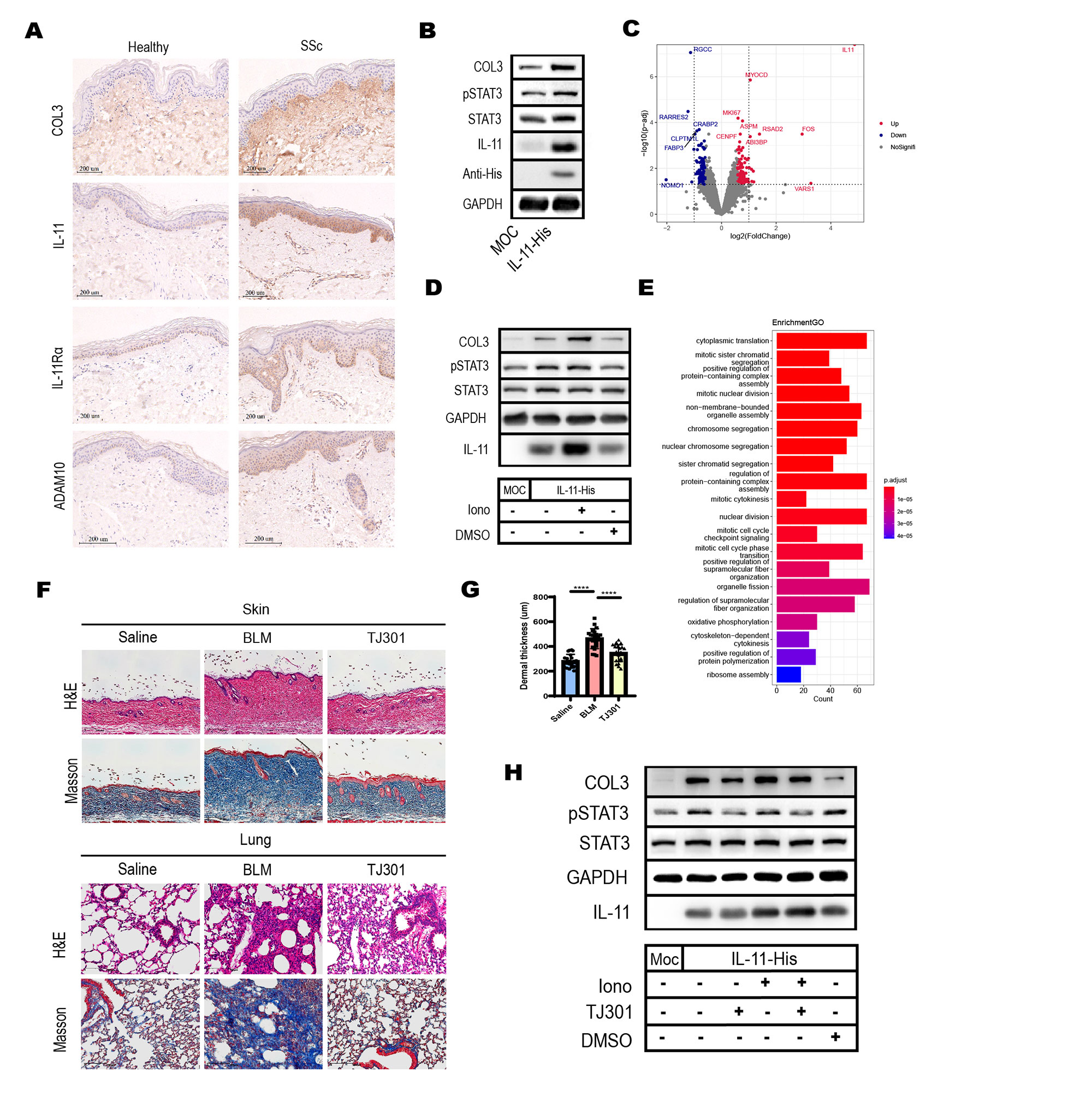Session Information
Date: Sunday, November 13, 2022
Title: Systemic Sclerosis and Related Disorders – Basic Science Poster
Session Type: Poster Session C
Session Time: 1:00PM-3:00PM
Background/Purpose: Interleukin-11 (IL-11) was found significantly upregulated in Systemic sclerosis (SSc), the aim of this study is to explore the pathological role of IL-11 and clarify the potential therapeutic value of targeting IL-11 in SSc.
Methods: Plasma IL-11 level was tested by ELISA, and the expression of ADAM10, IL-11 and IL-11Rα in skin were measured by immunohistochemistry. RNA-Seq was performed to analyze the transcription change in IL-11 overexpressing fibroblast cells. Soluble IL-11Rα (sIL-11Rα) induced by ionomycin (iono) was used to evaluate the pro-fibrotic effect of IL-11 trans-signaling pathway in fibroblast. TJ301(sgp130Fc, an inhibitor of IL-11 trans-signaling) intervention group was set up to investigate the anti-fibrosis effect of targeting IL-11 trans-signaling pathway in both cellular and animal experiments. Meanwhile, WP1066 was used to block STAT3 pathway in cellular study.
Results: Plasma IL-11 level was extremely low in most SSc patients and healthy controls, while IL-11, IL-11Rα and ADAM10 were significantly elevated in skin samples of SSc patients. RNA-Seq analysis displayed some fibrotic-related genes were dysregulated in IL-11 overexpressing cells, and differentially expressed genes (DEGs) were enriched in TGF-β effect and collagen metabolism pathway. Fibroblasts stimulated with IL-11 with iono could induce COL3 expression and STAT3 phosphorylation, and the pro-fibrotic effect could be inhibited by TJ301 or WP1066. TJ301 also ameliorated skin and lung fibrosis in BLM induced-SSc mice.
Conclusion: Besides classic signaling pathway, IL-11 contributes to pro-fibrosis in SSc through regulating trans-signaling pathway. Intervention of IL-11 trans-signaling pathway or JAK2/STAT3 pathway could ameliorate the pro-fibrotic response of IL-11.
To cite this abstract in AMA style:
Ye W, Wang Q, Zhao L, Wang C, Zhang D, Zhou M, Chen F, Zhu Z, Wang W, Guo W, Liu Y, Zou H, Xue Y. Interleukin-11 Promotes Fibrosis Through Classic and Trans-signaling Pathway in Systemic Sclerosis [abstract]. Arthritis Rheumatol. 2022; 74 (suppl 9). https://acrabstracts.org/abstract/interleukin-11-promotes-fibrosis-through-classic-and-trans-signaling-pathway-in-systemic-sclerosis/. Accessed .« Back to ACR Convergence 2022
ACR Meeting Abstracts - https://acrabstracts.org/abstract/interleukin-11-promotes-fibrosis-through-classic-and-trans-signaling-pathway-in-systemic-sclerosis/

